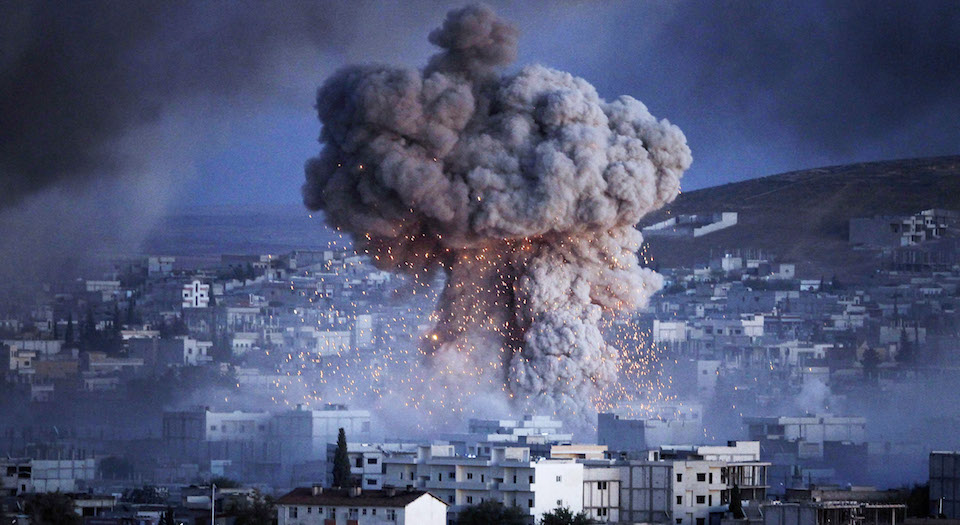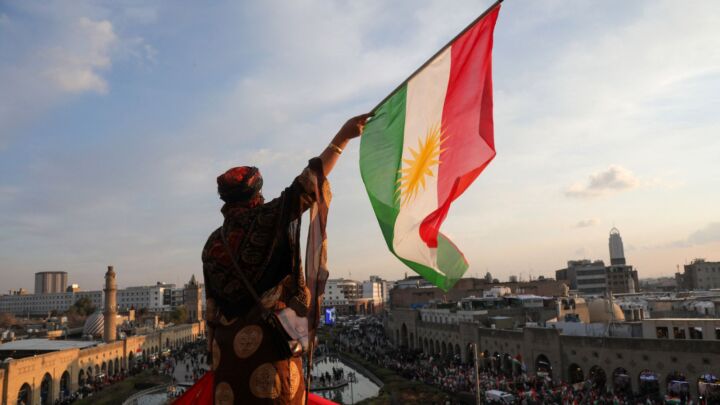To bomb or not to bomb? A plague on both their houses
Neither displacement nor defeatism will solve the West's real problems.

Want unlimited, ad-free access? Become a spiked supporter.
War or no war. Empire or national self-determination. Colonialism or freedom. For decades the question of war divided public opinion and animated political debate. The choice was often stark: did you give your nod to the march of vast numbers of men into foreign nations, or were you an objector, an anti-imperialist, maybe even a supporter of struggles against colonialism and Western meddling? Few issues split people as much as war did.
Fast forward to 2015 and things are very different. Almost unrecognisably different. Today, as demonstrated by the debate about whether to bomb Syria post-Paris, the choice isn’t between war or no war, between a belief in the right of the West to determine other states’ affairs and a principled opposition to such an idea. No, it’s between displacement and defeatism.
On one side stands a West that wants to drop bombs on Raqqa, not in order to export its way of life to other nations, but as a means of avoiding having to think about its way of life at all, or what threatens it in the 21st century, and how our values might be reimagined and refortified. The displacers. And on the other side there’s an anti-war sentiment that is motored, not by fire or a conviction that other peoples must have the right to determine their affairs, but by fear; a desire to hide from the world; a reluctance to do anything risky lest it come back to haunt us in the shape of future terror attacks. The defeatists.
Which side is spiked taking? Neither. We have no interest in the displacement activities of Western leaders and liberals who madly view Raqqa as the source of the corrosion of our values. Nor do we want anything to do with the defeatist mindset of the self-protection racket that is the modern anti-war movement. Our aim is to think seriously both about how Enlightenment values might be strengthened today, and how the Islamic State might be weakened, and ultimately destroyed. Airstrikes in Syria will achieve neither of those things — and nor will the fearful opposition to them.
In the run-up to this week’s potential vote in the UK parliament on whether to bomb Syria, the shortcomings of both sides in this sorry debate have become clear. On the pro-bombing side, the overarching instinct is to avoid the profound, very difficult questions thrown up by Paris, and by earlier terror assaults, and instead take to the skies and fire some missiles at Raqqa, as if that godforsaken city were the source of the confusions and crises of the Western world. A deep, historic crisis of purpose in the West — which is now so pronounced that a significant number of Belgian, French and British citizens devote their lives to attacking our societies — is reimagined as a foreign threat, festering far away in an exotic, IS-ruled city. Bombing Raqqa is a displacement activity of epic proportions, a substitution of militarism for any notion of how to rediscover meaning in the West and cohere our societies around a common vision.
The way the pro-bombing side talks about Raqqa is striking. ‘It is from Raqqa that some of the main threats against this country [emanate]’, says David Cameron. London mayor Boris Johnson says Raqqa is ‘the origin’ of the violence facing France, Britain and other European nations. He describes the city as ‘a landscape of the imagination for the Western would-be jihadists and those at risk of radicalisation’. In short, this capital city of IS barbarism is the lure to our misguided youth, tempting them towards nihilism and chaotic violence. The phrase used by many of those in favour of bombing — that Raqqa is ‘the head of the snake’ — is especially striking, suggesting that if we pummel IS in Raqqa then the poison of Islamo-extremism will dissipate, and die.
This is so wrong. Even if Raqqa were to be obliterated, and IS with it, the problem of Paris and other recent attacks, and of Islamic radicalisation in the West more broadly, would still exist. In fact, these things existed even when Assad was fully in control of Raqqa and before IS was formed. From Madrid to 7/7 to the stabbing of Theo van Gogh, from the rise of Islamist militancy on Western campuses to the growing disdain for Enlightenment values among both Muslim and other Western youths, the embrace of Islamism by Western-born or Western-educated individuals was happening long before IS conquered Raqqa. And that’s because the entrenchment in Europe of an Islamism that self-consciously juxtaposes itself to an allegedly decadent West speaks far more to a crisis of values here at home than it does to the rise of an extremist caliphate in the city of Raqqa.
This is what our leaders are utterly incapable of getting to grips with: the way in which the West’s own abandonment of its commitment to the Enlightenment values of liberty and democracy, and its embrace instead of the toxic politics of identity, the culture of victimhood and the divisive ideology of multiculturalism, has done far more than any finger-wagging imam in a Syrian bolthole to cultivate self-pitying, West-hating Islamism within our communities, which occasionally explodes into violence. It isn’t the pull of ‘the landscape of the imagination’ of Raqqa which explains the rise of Islamo-nihilism in the West; it’s the push of our own societies’ ditching of liberal values and cultivation of new forms of separatism and communalism.
Bombing Raqqa would not be, as Clausewitz thought of war, ‘the continuation of politics by other means’. It would be the avoidance of politics, the avoidance of the moral crisis facing the West. It would represent a militaristic stand-in for the moral rethink the West so urgently needs. Even supporters of bombing Syria admit that their militarism might make things worse, but it will at least represent, they say, a loud display of some kind of Western value or ideal. Tony Blair’s former speechwriter, Philip Collins, has argued that, yes, Western bombs will ‘mean chaos’, but at least we’ll ‘add weight to our moral impulse’. There. That’s exactly what the argument for attacking Raqqa represents: a desperate desire to add weight to something that our leaders can no longer articulate in any meaningful way or with ideas or policies: an idea of the good, Enlightened West. Bombs take the place of vision.
But the other side, the anti-war side, also has little to recommend it. For what we have here is not a coherent opposition to Western militarism, far less a recognition of the profound problems emanating from within West itself, but rather a sentiment that says: ‘Stop the world, I want to get off.’ Cowardice, not principle, is the motor of this outlook.
This can be glimpsed in the anti-war side’s non-stop talk of ‘blowback’. The great fear is that if we act, they will act back. Our bombing will ‘come back to haunt us’, says former London mayor Ken Livingstone. One observer warns that ‘any government that attacks the Islamic State should realise that retaliation against people innocently going about their lives… is likely’. In short, if you do anything against IS, your people will die: cowardly moral blackmail. Others claim IS is entirely a product of Western action. It was the Bush administration’s foreign policy that was ‘central to how [this] group became the force the world is so worried about today’, says one columnist.
These ‘blowback’ theories are meant to sound radical; they’re anything but. They treat Middle Eastern affairs as entirely one-dimensional, as if everything there is a product of the decisions and actions of the West. This utterly robs the people in that part of the world of moral agency, reducing them to mere actors in a narrative dictated by us. But the only people responsible for IS are IS itself; and the only people responsible for the massacres in Paris are those who carried them out.
Worse, the blowback theory is now used, not to try to explain the unravelling impact Western intervention can have in global affairs, but rather to say: ‘Action is too dangerous. Don’t risk it. Let’s just stay in bed.’ It’s Little Englandism disguised as anti-imperialism.
And it leaves a stark question unanswered, one which the pro-bombing side also cannot answer: what should be done about the Islamic State? spiked wants IS defeated. These barbaric religious theocrats are a scourge, causing immense suffering to people in Raqqa and beyond. Surely we want IS destroyed? If so, it is not enough to say, ‘Don’t do anything, it’s too risky, we might get hurt’. Risks must sometimes be taken in the name of combatting barbarism and defending people and liberty.
spiked’s view is that bombing Raqqa will not achieve either of the things we’re interested in: defeating IS and repairing the severely damaged Enlightenment and liberal outlook in the West. No, to defeat IS, we need a far greater commitment to supporting the Kurds — really supporting them, which will give rise to more war, in the short term, not less. And to rediscover Western purpose and liberal values we need to ditch all the displacement activity and reimagine every aspect of our societies. Both of these projects will be difficult, and risky. But nothing worth having is ever won without putting your neck and your values on the line.
Brendan O’Neill is editor of spiked.
Picture by: Gokhan Sahin / Stringer / Getty Images.
£1 a month for 3 months
You’ve hit your monthly free article limit.
Support spiked and get unlimited access.
Support spiked – £1 a month for 3 months
spiked is funded by readers like you. Only 0.1% of regular readers currently support us. If just 1% did, we could grow our team and step up the fight for free speech and democracy.
Become a spiked supporter and enjoy unlimited, ad-free access, bonus content and exclusive events – while helping to keep independent journalism alive.
———————————————————————————————————————————–
Exclusive January offer: join today for £1 a month for 3 months. Then £5 a month, cancel anytime.
———————————————————————————————————————————–
Monthly support makes the biggest difference. Thank you.











Comments
Want to join the conversation?
Only spiked supporters and patrons, who donate regularly to us, can comment on our articles.